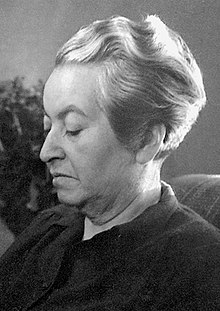Gabriela Mistral
| Gabriela Mistral | |
|---|---|
 |
|
| Born | Lucila de María del Perpetuo Socorro Godoy Alcayaga April 7, 1889 Vicuña, Chile |
| Died | January 10, 1957 (aged 67) Hempstead, New York |
| Occupation | Educator, Diplomat, Poet |
| Nationality | Chilean |
| Period | 1914–1957 |
| Notable awards |
Nobel Prize in Literature 1945 |
|
|
|
| Signature | |
Gabriela Mistral (Spanish: [ɡaˈβɾjela misˈtɾal]; 7 April 1889 – 10 January 1957) was the pseudonym of Lucila Godoy y Alcayaga, a Chilean poet-diplomat, educator and humanist. In 1945 she became the first Latin American author to receive a Nobel Prize in Literature, "for her lyric poetry which, inspired by powerful emotions, has made her name a symbol of the idealistic aspirations of the entire Latin American world". Some central themes in her poems are nature, betrayal, love, a mother's love, sorrow and recovery, travel, and Latin American identity as formed from a mixture of Native American and European influences. Her portrait also appears on the 5,000 Chilean peso bank note.
Mistral was born in Vicuña, Chile, but was raised in the small Andean village of Montegrande, where she attended a primary school taught by her older sister, Emelina Molina. She respected her sister greatly, despite the many financial problems that Emelina brought her in later years. Her father, Juan Gerónimo Godoy Villanueva, was also a schoolteacher. He abandoned the family before she was three years old, and died, long since estranged from the family, in 1911. Throughout her early years she was never far from poverty. By age fifteen, she was supporting herself and her mother, Petronila Alcayaga, a seamstress, by working as a teacher's aide in the seaside town of Compañia Baja, near La Serena, Chile.
In 1904 Mistral published some early poems, such as Ensoñaciones ("Dreams"), Carta Íntima ("Intimate Letter") and Junto al Mar ("By the Sea"), in the local newspaper El Coquimbo: Diario Radical, and La Voz de Elqui using a range of pseudonyms and variations on her civil name.
Probably in about 1906, while working as a teacher, Mistral met Romelio Ureta, a railway worker, who killed himself in 1909. The profound effects of death were already in the poet's work; writing about his suicide led the poet to consider death and life more broadly than previous generations of Latin American poets. While Mistral had passionate friendships with various men and women, and these impacted her writings, she was secretive about her emotional life.
...
Wikipedia
